An Examination of the Ethics Surrounding Tobacco Advertisement
VerifiedAdded on 2022/09/05
|6
|928
|47
Essay
AI Summary
This paper critically examines the ethics of tobacco advertising, arguing that current practices are unethical due to a lack of transparency and social responsibility. The author highlights how tobacco advertising beautifies the image of tobacco companies, misleads the public, and encourages consumption, particularly among adolescents. The essay emphasizes the addictiveness and lethality of tobacco products, questioning the ethical implications of donations and sponsorships by tobacco companies, which are seen as disguised marketing tactics. The author supports the World Framework Convention on Tobacco Control, advocating for a ban on all tobacco advertising, promotion, and sponsorship, including donations. The paper concludes by asserting that tobacco companies violate principles of accountability, transparency, and ethical behavior, thereby failing to act in a socially responsible manner. The author also uses a source from CDC to show the relationship between cigarette use and advertising.
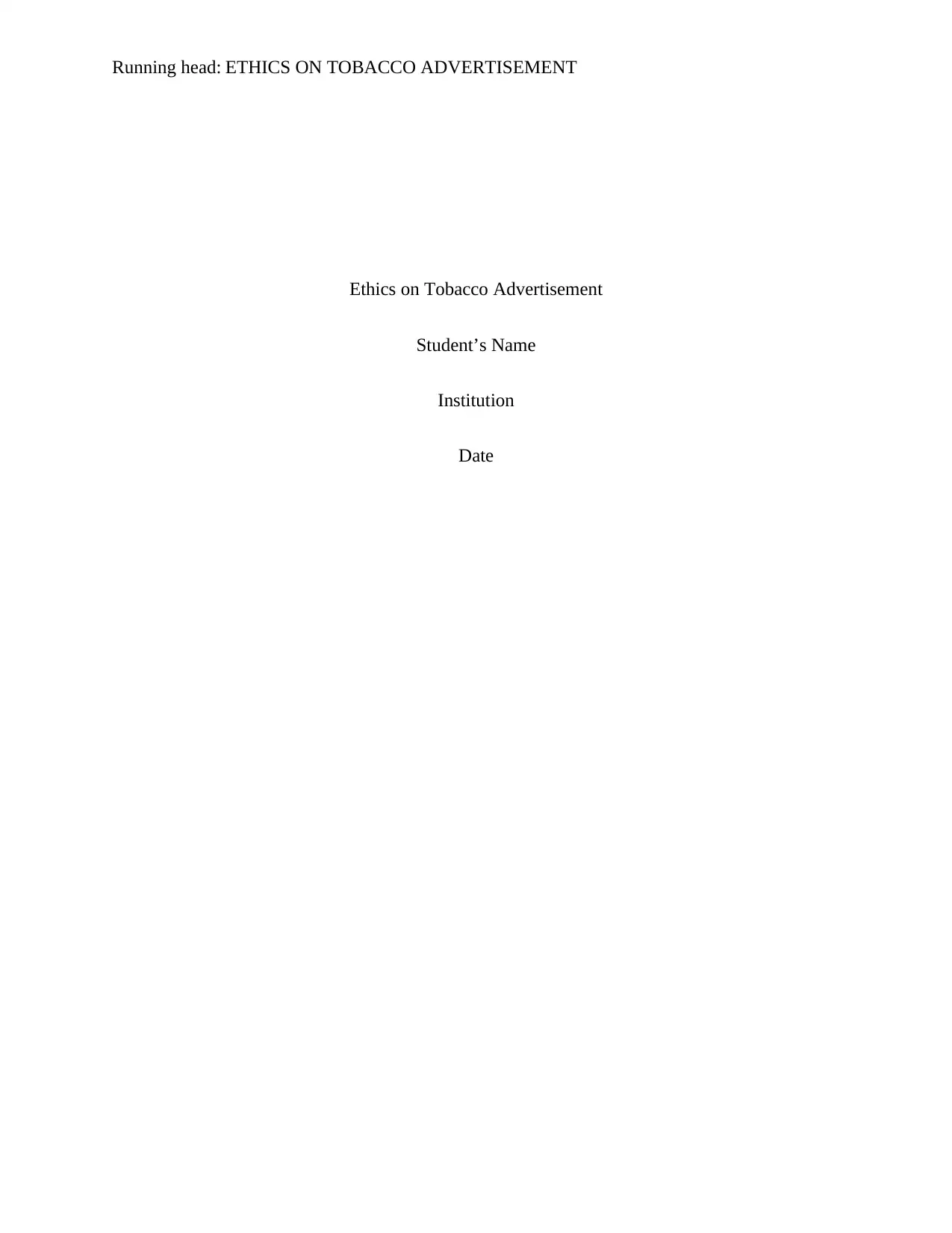
Running head: ETHICS ON TOBACCO ADVERTISEMENT
Ethics on Tobacco Advertisement
Student’s Name
Institution
Date
Ethics on Tobacco Advertisement
Student’s Name
Institution
Date
Paraphrase This Document
Need a fresh take? Get an instant paraphrase of this document with our AI Paraphraser
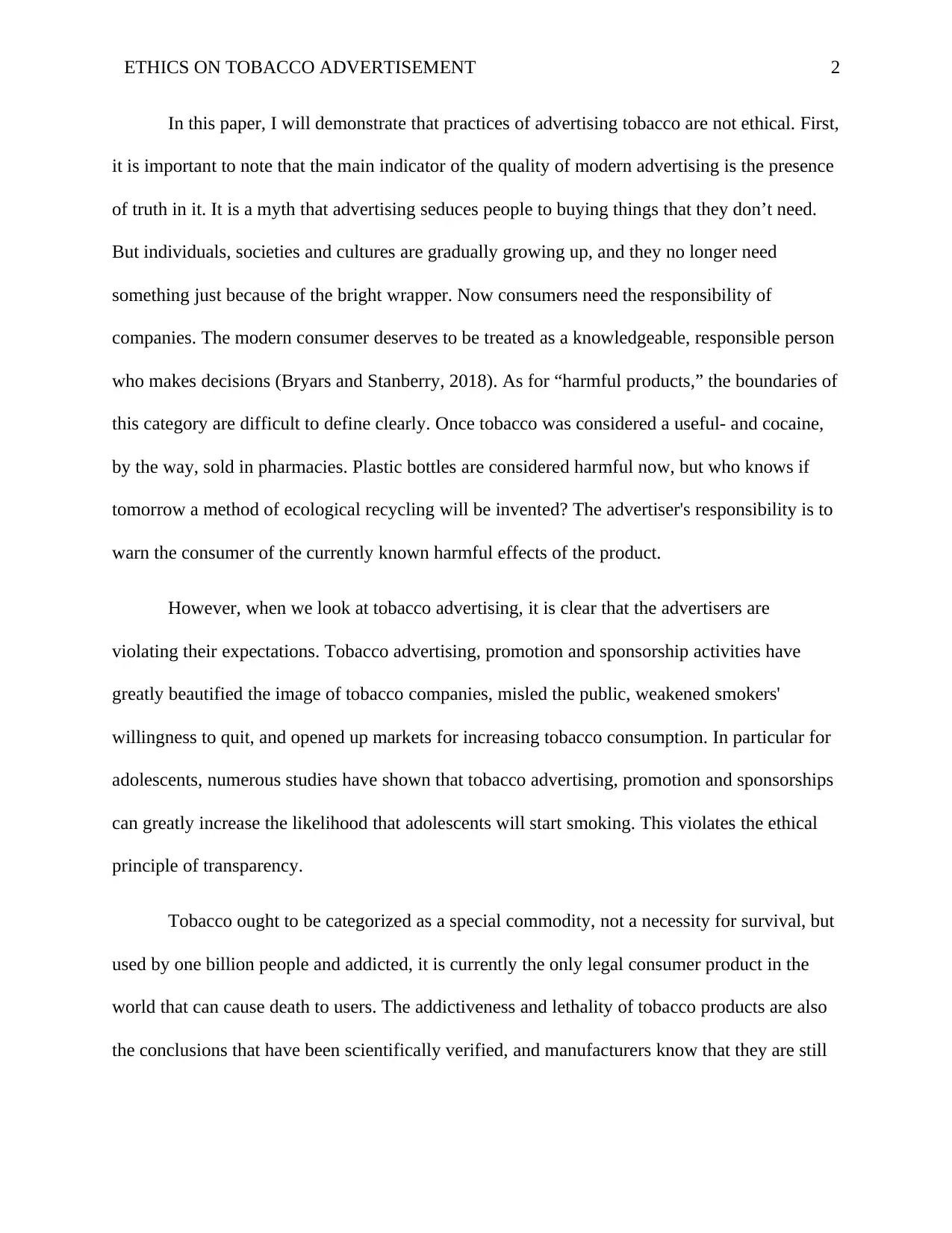
ETHICS ON TOBACCO ADVERTISEMENT 2
In this paper, I will demonstrate that practices of advertising tobacco are not ethical. First,
it is important to note that the main indicator of the quality of modern advertising is the presence
of truth in it. It is a myth that advertising seduces people to buying things that they don’t need.
But individuals, societies and cultures are gradually growing up, and they no longer need
something just because of the bright wrapper. Now consumers need the responsibility of
companies. The modern consumer deserves to be treated as a knowledgeable, responsible person
who makes decisions (Bryars and Stanberry, 2018). As for “harmful products,” the boundaries of
this category are difficult to define clearly. Once tobacco was considered a useful- and cocaine,
by the way, sold in pharmacies. Plastic bottles are considered harmful now, but who knows if
tomorrow a method of ecological recycling will be invented? The advertiser's responsibility is to
warn the consumer of the currently known harmful effects of the product.
However, when we look at tobacco advertising, it is clear that the advertisers are
violating their expectations. Tobacco advertising, promotion and sponsorship activities have
greatly beautified the image of tobacco companies, misled the public, weakened smokers'
willingness to quit, and opened up markets for increasing tobacco consumption. In particular for
adolescents, numerous studies have shown that tobacco advertising, promotion and sponsorships
can greatly increase the likelihood that adolescents will start smoking. This violates the ethical
principle of transparency.
Tobacco ought to be categorized as a special commodity, not a necessity for survival, but
used by one billion people and addicted, it is currently the only legal consumer product in the
world that can cause death to users. The addictiveness and lethality of tobacco products are also
the conclusions that have been scientifically verified, and manufacturers know that they are still
In this paper, I will demonstrate that practices of advertising tobacco are not ethical. First,
it is important to note that the main indicator of the quality of modern advertising is the presence
of truth in it. It is a myth that advertising seduces people to buying things that they don’t need.
But individuals, societies and cultures are gradually growing up, and they no longer need
something just because of the bright wrapper. Now consumers need the responsibility of
companies. The modern consumer deserves to be treated as a knowledgeable, responsible person
who makes decisions (Bryars and Stanberry, 2018). As for “harmful products,” the boundaries of
this category are difficult to define clearly. Once tobacco was considered a useful- and cocaine,
by the way, sold in pharmacies. Plastic bottles are considered harmful now, but who knows if
tomorrow a method of ecological recycling will be invented? The advertiser's responsibility is to
warn the consumer of the currently known harmful effects of the product.
However, when we look at tobacco advertising, it is clear that the advertisers are
violating their expectations. Tobacco advertising, promotion and sponsorship activities have
greatly beautified the image of tobacco companies, misled the public, weakened smokers'
willingness to quit, and opened up markets for increasing tobacco consumption. In particular for
adolescents, numerous studies have shown that tobacco advertising, promotion and sponsorships
can greatly increase the likelihood that adolescents will start smoking. This violates the ethical
principle of transparency.
Tobacco ought to be categorized as a special commodity, not a necessity for survival, but
used by one billion people and addicted, it is currently the only legal consumer product in the
world that can cause death to users. The addictiveness and lethality of tobacco products are also
the conclusions that have been scientifically verified, and manufacturers know that they are still
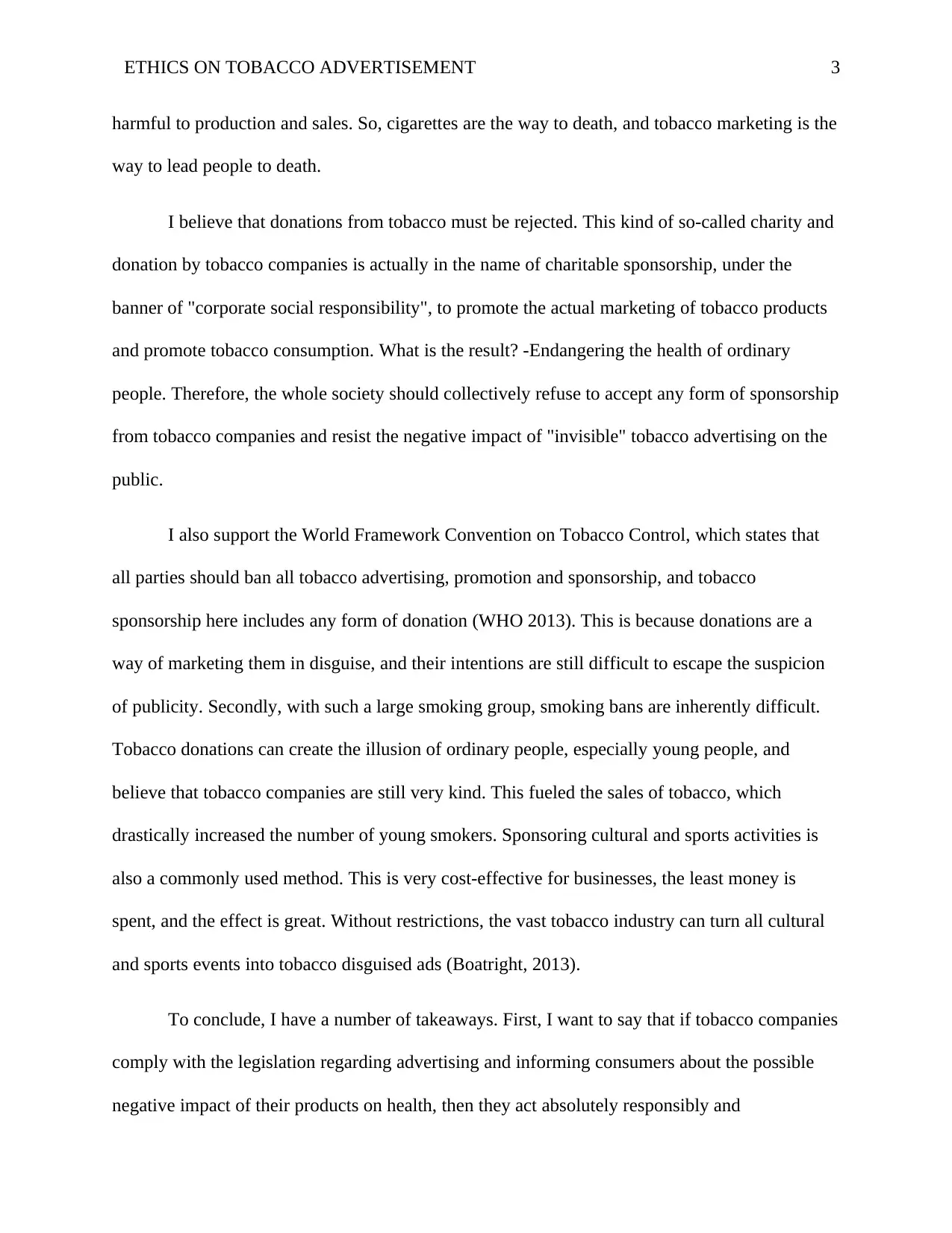
ETHICS ON TOBACCO ADVERTISEMENT 3
harmful to production and sales. So, cigarettes are the way to death, and tobacco marketing is the
way to lead people to death.
I believe that donations from tobacco must be rejected. This kind of so-called charity and
donation by tobacco companies is actually in the name of charitable sponsorship, under the
banner of "corporate social responsibility", to promote the actual marketing of tobacco products
and promote tobacco consumption. What is the result? -Endangering the health of ordinary
people. Therefore, the whole society should collectively refuse to accept any form of sponsorship
from tobacco companies and resist the negative impact of "invisible" tobacco advertising on the
public.
I also support the World Framework Convention on Tobacco Control, which states that
all parties should ban all tobacco advertising, promotion and sponsorship, and tobacco
sponsorship here includes any form of donation (WHO 2013). This is because donations are a
way of marketing them in disguise, and their intentions are still difficult to escape the suspicion
of publicity. Secondly, with such a large smoking group, smoking bans are inherently difficult.
Tobacco donations can create the illusion of ordinary people, especially young people, and
believe that tobacco companies are still very kind. This fueled the sales of tobacco, which
drastically increased the number of young smokers. Sponsoring cultural and sports activities is
also a commonly used method. This is very cost-effective for businesses, the least money is
spent, and the effect is great. Without restrictions, the vast tobacco industry can turn all cultural
and sports events into tobacco disguised ads (Boatright, 2013).
To conclude, I have a number of takeaways. First, I want to say that if tobacco companies
comply with the legislation regarding advertising and informing consumers about the possible
negative impact of their products on health, then they act absolutely responsibly and
harmful to production and sales. So, cigarettes are the way to death, and tobacco marketing is the
way to lead people to death.
I believe that donations from tobacco must be rejected. This kind of so-called charity and
donation by tobacco companies is actually in the name of charitable sponsorship, under the
banner of "corporate social responsibility", to promote the actual marketing of tobacco products
and promote tobacco consumption. What is the result? -Endangering the health of ordinary
people. Therefore, the whole society should collectively refuse to accept any form of sponsorship
from tobacco companies and resist the negative impact of "invisible" tobacco advertising on the
public.
I also support the World Framework Convention on Tobacco Control, which states that
all parties should ban all tobacco advertising, promotion and sponsorship, and tobacco
sponsorship here includes any form of donation (WHO 2013). This is because donations are a
way of marketing them in disguise, and their intentions are still difficult to escape the suspicion
of publicity. Secondly, with such a large smoking group, smoking bans are inherently difficult.
Tobacco donations can create the illusion of ordinary people, especially young people, and
believe that tobacco companies are still very kind. This fueled the sales of tobacco, which
drastically increased the number of young smokers. Sponsoring cultural and sports activities is
also a commonly used method. This is very cost-effective for businesses, the least money is
spent, and the effect is great. Without restrictions, the vast tobacco industry can turn all cultural
and sports events into tobacco disguised ads (Boatright, 2013).
To conclude, I have a number of takeaways. First, I want to say that if tobacco companies
comply with the legislation regarding advertising and informing consumers about the possible
negative impact of their products on health, then they act absolutely responsibly and
⊘ This is a preview!⊘
Do you want full access?
Subscribe today to unlock all pages.

Trusted by 1+ million students worldwide
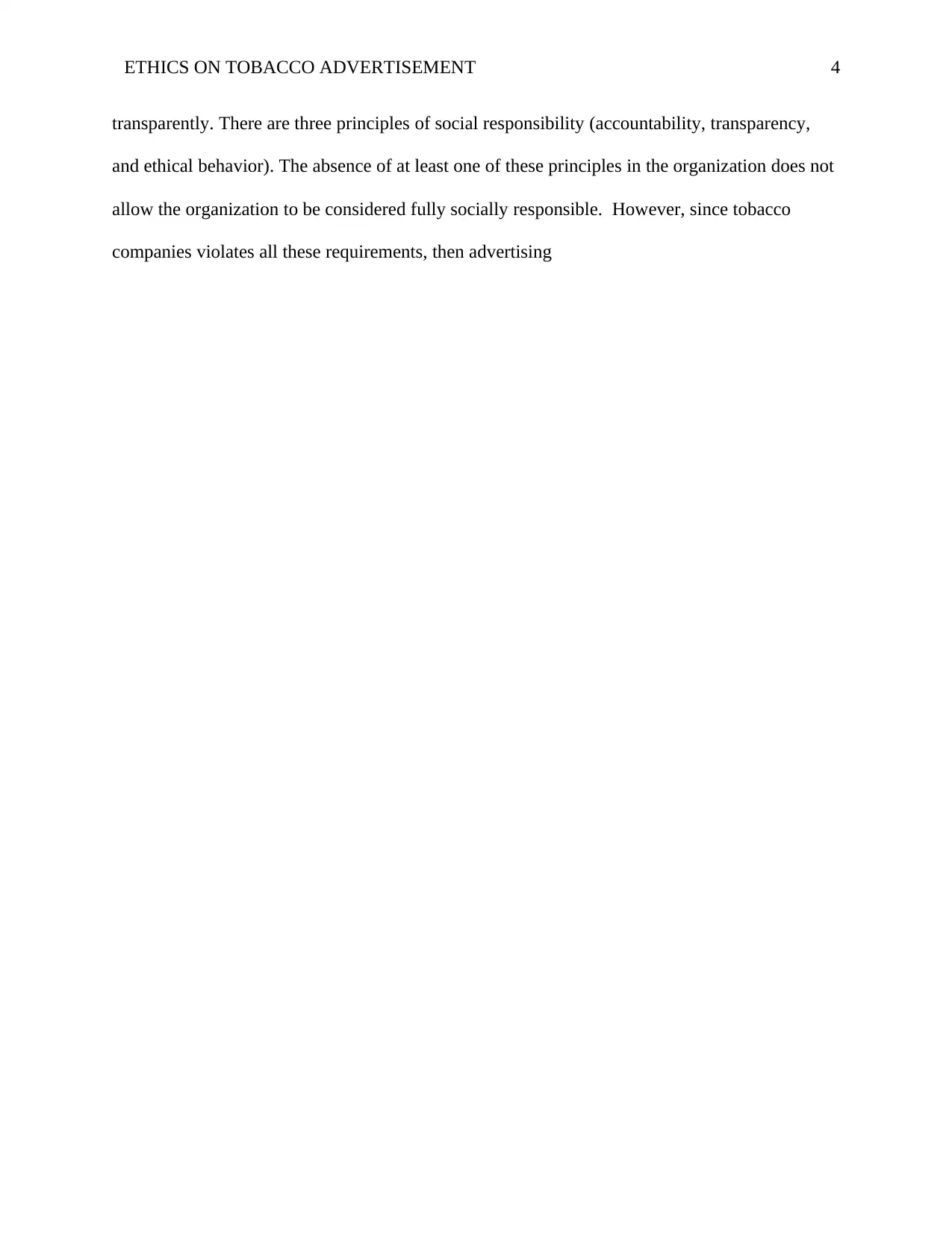
ETHICS ON TOBACCO ADVERTISEMENT 4
transparently. There are three principles of social responsibility (accountability, transparency,
and ethical behavior). The absence of at least one of these principles in the organization does not
allow the organization to be considered fully socially responsible. However, since tobacco
companies violates all these requirements, then advertising
transparently. There are three principles of social responsibility (accountability, transparency,
and ethical behavior). The absence of at least one of these principles in the organization does not
allow the organization to be considered fully socially responsible. However, since tobacco
companies violates all these requirements, then advertising
Paraphrase This Document
Need a fresh take? Get an instant paraphrase of this document with our AI Paraphraser
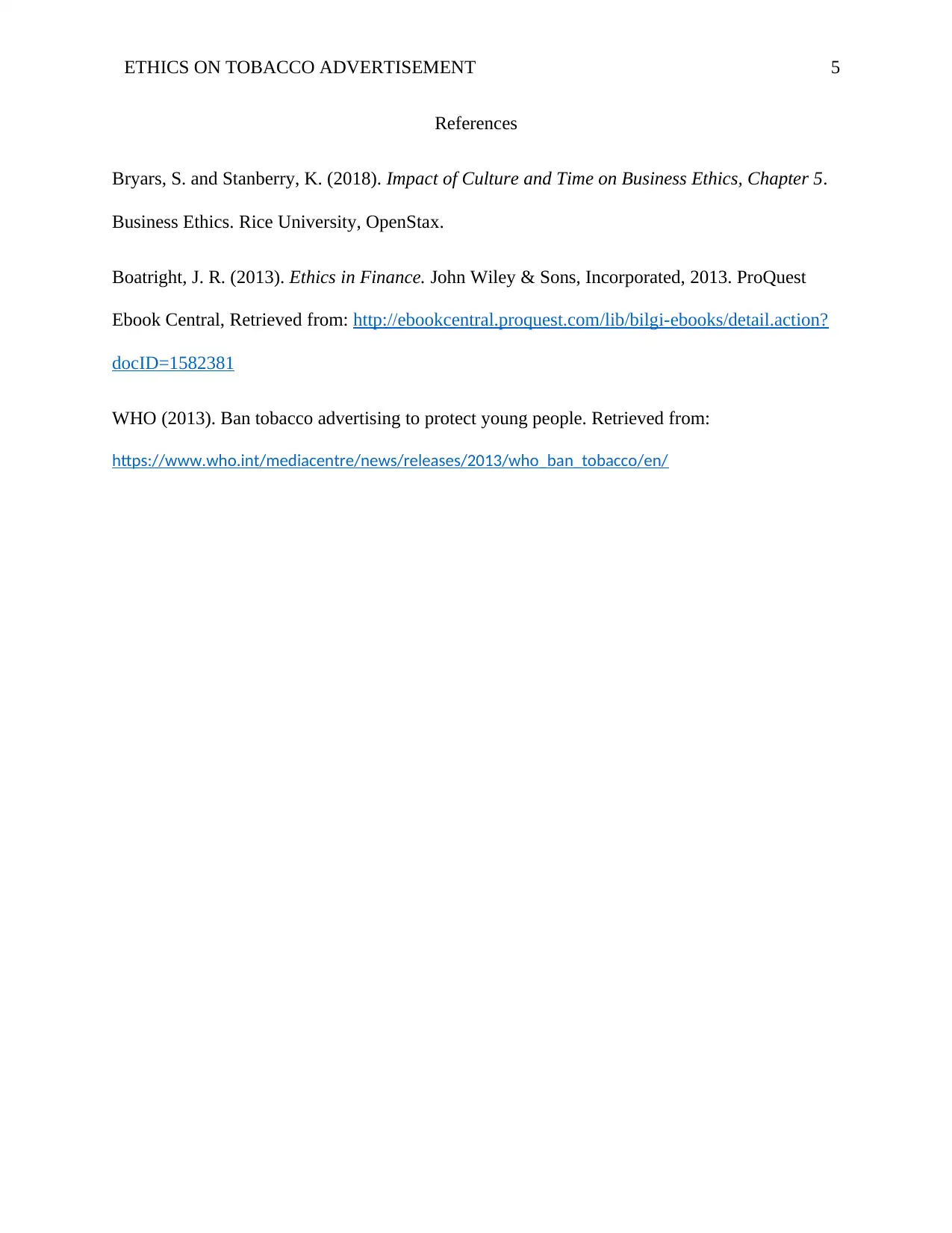
ETHICS ON TOBACCO ADVERTISEMENT 5
References
Bryars, S. and Stanberry, K. (2018). Impact of Culture and Time on Business Ethics, Chapter 5.
Business Ethics. Rice University, OpenStax.
Boatright, J. R. (2013). Ethics in Finance. John Wiley & Sons, Incorporated, 2013. ProQuest
Ebook Central, Retrieved from: http://ebookcentral.proquest.com/lib/bilgi-ebooks/detail.action?
docID=1582381
WHO (2013). Ban tobacco advertising to protect young people. Retrieved from:
https://www.who.int/mediacentre/news/releases/2013/who_ban_tobacco/en/
References
Bryars, S. and Stanberry, K. (2018). Impact of Culture and Time on Business Ethics, Chapter 5.
Business Ethics. Rice University, OpenStax.
Boatright, J. R. (2013). Ethics in Finance. John Wiley & Sons, Incorporated, 2013. ProQuest
Ebook Central, Retrieved from: http://ebookcentral.proquest.com/lib/bilgi-ebooks/detail.action?
docID=1582381
WHO (2013). Ban tobacco advertising to protect young people. Retrieved from:
https://www.who.int/mediacentre/news/releases/2013/who_ban_tobacco/en/
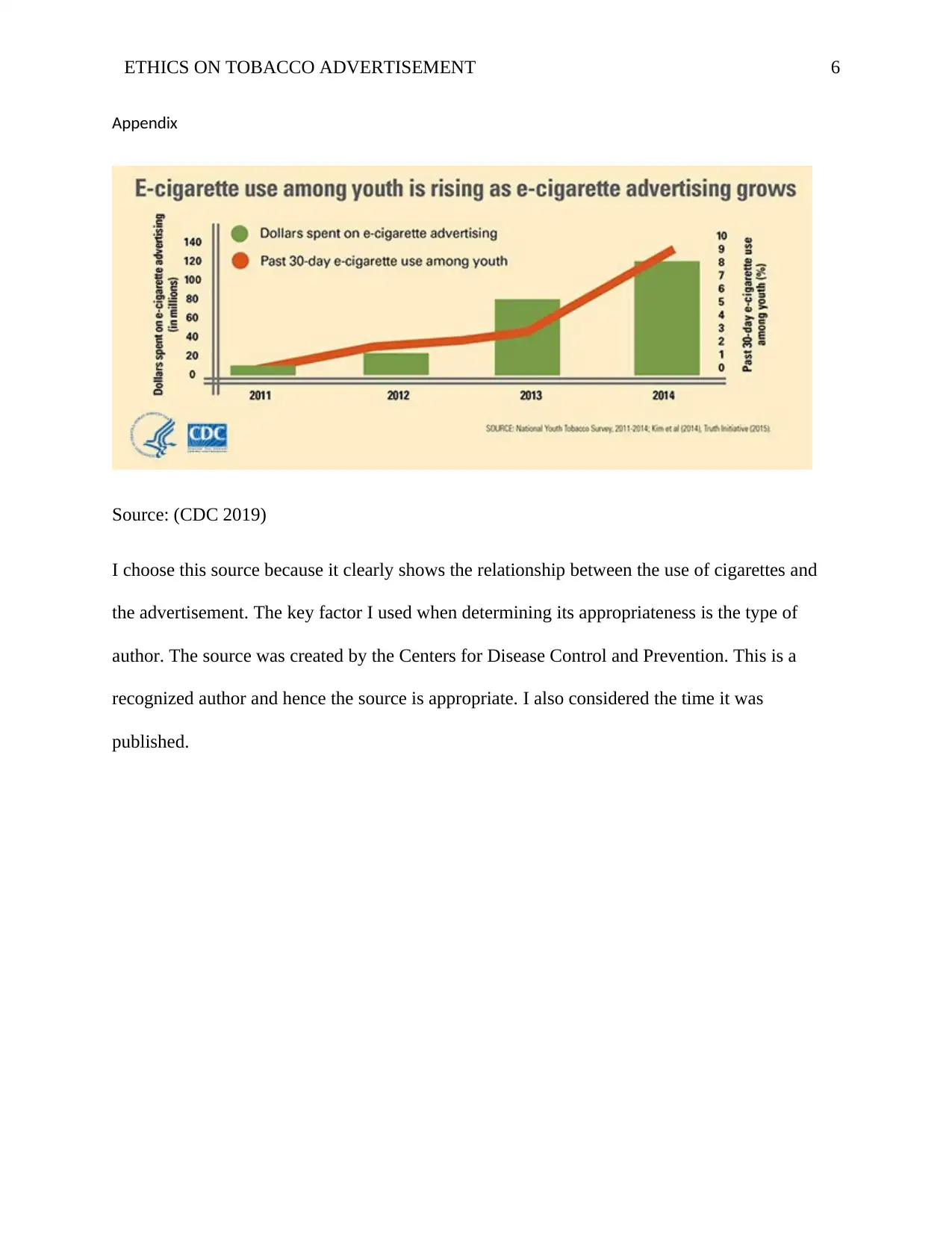
ETHICS ON TOBACCO ADVERTISEMENT 6
Appendix
Source: (CDC 2019)
I choose this source because it clearly shows the relationship between the use of cigarettes and
the advertisement. The key factor I used when determining its appropriateness is the type of
author. The source was created by the Centers for Disease Control and Prevention. This is a
recognized author and hence the source is appropriate. I also considered the time it was
published.
Appendix
Source: (CDC 2019)
I choose this source because it clearly shows the relationship between the use of cigarettes and
the advertisement. The key factor I used when determining its appropriateness is the type of
author. The source was created by the Centers for Disease Control and Prevention. This is a
recognized author and hence the source is appropriate. I also considered the time it was
published.
⊘ This is a preview!⊘
Do you want full access?
Subscribe today to unlock all pages.

Trusted by 1+ million students worldwide
1 out of 6
Related Documents
Your All-in-One AI-Powered Toolkit for Academic Success.
+13062052269
info@desklib.com
Available 24*7 on WhatsApp / Email
![[object Object]](/_next/static/media/star-bottom.7253800d.svg)
Unlock your academic potential
Copyright © 2020–2025 A2Z Services. All Rights Reserved. Developed and managed by ZUCOL.





